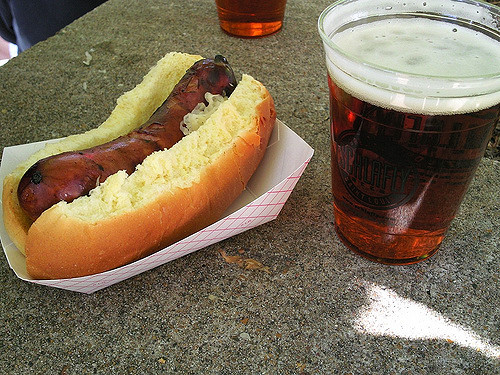Perfect Pairing: 5 Myths About Florida Breweries and Restaurants
Nothing goes better with fresh brewed beer than a fresh cooked bratwurst–or pizza, or a burger, or a million other foods. So why don’t more Florida breweries have restaurants attached? For some breweries, it could be because of one of the several myths that persist about that perfect pairing: brewery and restaurant.
Myth #1: A Florida production brewery cannot hold a restaurant license.
Nothing in the federal or state law prohibits the owner of a licensed production brewery (that is, issued a CMB license by the Florida Division of Alcoholic Beverages and Tobacco (ABT)) from being issued a food service license, including a full-service restaurant license. The first step to food service licensing is to determine who needs to license you. If the food you are offering is limited to ice, beverages, popcorn, or prepackaged items sold without additions or preparation, then you’ll need approval from the county Department of Health office. If your services will include preparing or serving food for immediate consumption or take-out, then you’ll need a permanent food service license issued by the Florida Division of Hotels and Restaurants.
Myth #2: A Florida licensed brewpub must operate a restaurant.
Nothing in the Florida Beverage Law currently requires that a business holding a brewpub license (that is, issued a CMBP license by the ABT) must operate a restaurant or provide food services of any kind. However, the last two years have seen proposed changes to the Florida Beverage Law that would require new brewpubs to provide some level of food services. Anyone considering applying for a new brewpub license should tread cautiously if their plans do not include food services.
Myth #3: A restaurant attached to a production brewery cannot serve alcohol.
Provided a Florida brewery holds a 4COP license for the restaurant portion, spirits, wine and beer can all be sold. A brewery might hold a 4COP quota license, for which a limited number are available in each county, or a 4COP-SRX, which is available to any restaurant (including a brewery restaurant), provide 51% of revenue comes from the sale of food. A brewery that holds a 4COP license needs to be especially caution to prohibit any spirits from entering into the brewing premises–that’s a violation of law.
Myth #4: An existing restaurant can add a production brewery at any time.
In fact, it’s not clear whether the Florida Beverage Law permits an existing vendor from being issued a manufacturing license. The reason is that Florida’s version of the Tied House Evil law prohibits vendors from having a relationship with manufacturers, unless a specific exceptions applies. The taproom exception clearly allows a licensed brewery to be issued a vendor license for an adjoining or nearby taproom, but it isn’t clear that this works in the other direction. At least one ABT district office has said that it does not. The lesson: proceed cautiously if you currently hold an alcoholic beverage license and you want to add a brewery to your location.
Myth #5: It’s easy to operate a restaurant as part of your brewery.
The restaurant business is very different than the brewing business. Even operating a taproom isn’t the same thing as operating a restaurant. For most breweries, the best idea might be to leave operating restaurant to the restauranteurs. Give brewery owners credit: This is a reason to decide against adding a restaurant to a brewery.


